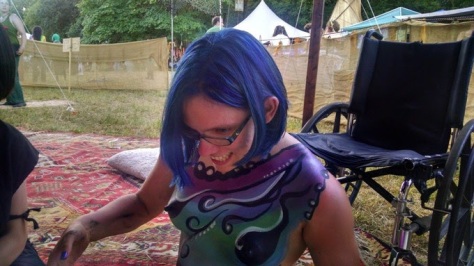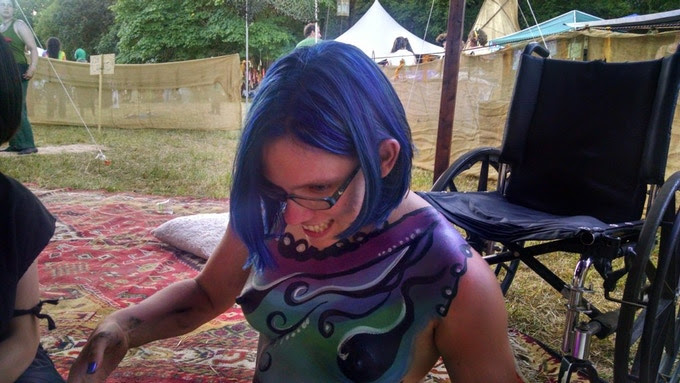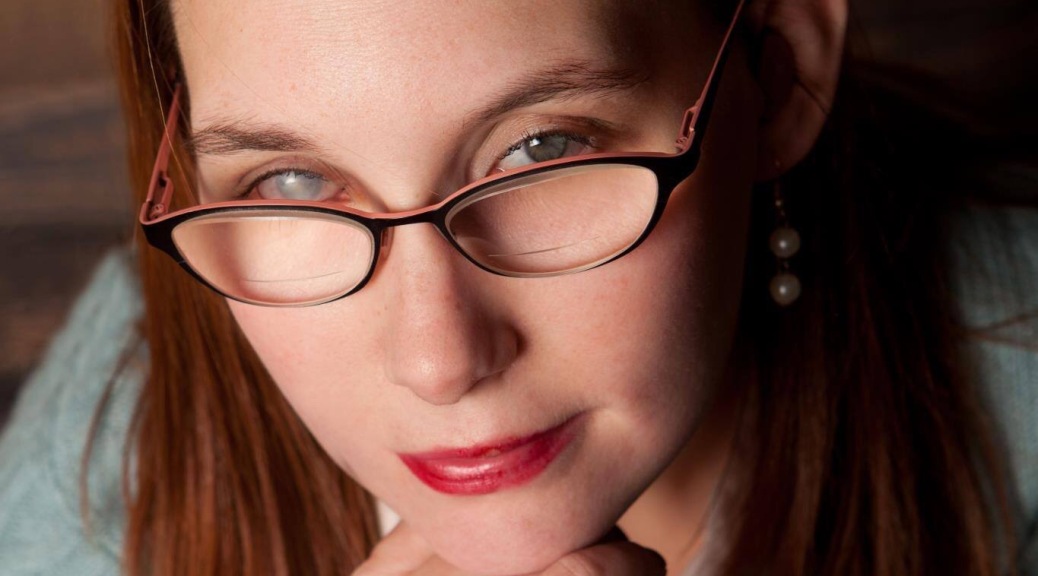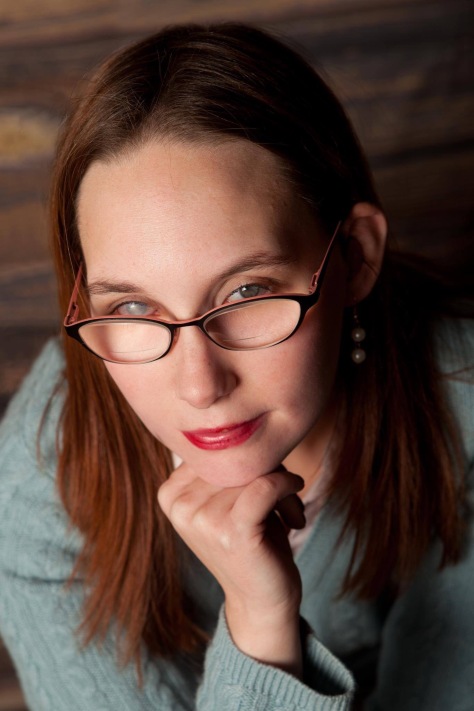Interview with Nicolette Barischoff
By Derek Newman-Stille

I was able to work with the wonderful Nicolette Barischoff when we were both included in the collection Accessing the Future (edited by Kathryn Allan and Djibril al-Ayad) a few years ago and just recently had the pleasure of working with Nicolette again when she edited my personal narrative submission as part of Uncanny Magazine’s Disabled People Destroy Science Fiction. As always, Nicolette had a plethora of ideas and I realized I had to share some of her insights with readers here on Dis(Abled) Embodiment. I want to thank Nicolette for joining us here and taking the time to do an interview.
Q: To start our interview off, could you tell readers a little bit about yourself?
Nicolette Barischoff: Well, I’m a speculative fiction writer. That’s probably the least visible and most important thing I do. I’m also a chronically naked performance artist and art model. That’s a big part of my activism. It’s very important to me that we get people used to seeing many different types of bodies, and that we normalize the sight of visibly disabled bodies in particular. I have Spastic Cerebral Palsy and I use a wheelchair unless I feel like crawling (which I do, frequently).
Q: Could you tell us a bit about how you interact with disability in various ways?
Nicolette Barischoff: I resisted disability as a large part of my identity for a the greater part of my life. I’ve always identified as disabled (having a visible disability kind of forces you to be out and proud) but I fiercely resisted the idea of myself as Disabled Writer or a Disability Activist throughout my teens and early twenties. I think I thought of able-bodied peoples’ preoccupation with my disability as a distraction from the things I really wanted to say and write. To a certain degree, I still think that’s true. But as I grew into a proper adult, and as body and sex positivity became more and more important to me, I realized that I couldn’t be Body-Positive without being actively Disability-Positive. I have a very visibly disabled body. It’s the body I will always have. The two activisms are not separate spheres. They never can be.
Q: How have you interacted with ableism in the past?
Nicolette Barischoff: For me, ableism always seems to take the form of a struggle over personal autonomy. Many of the abled people in our lives really do want to empower us to make our own choices, but they often have trouble respecting those choices when they find them alarming or inconvenient or odd. They feel entitled, often compelled, to step in. Every disabled person I have ever met has at one time or another had their personal autonomy overridden for the comfort and convenience of the able-bodied, sometimes for the comfort and convenience of total strangers. Another off-shoot of this kind of ableism is when a disabled person is denied the assistance they need in the name of promoting their autonomy. I often encounter this at women’s clinics, where they don’t let my partner/assistant past the front desk in the name of protecting my privacy. Able people often fail to recognize a disabled person’s autonomy when it comes in the form of assisted living.
To be a true advocate for disabled rights (or human rights generally) is to empower autonomy, even when that autonomy is expressed in ways you do not fully understand or support.
Q: What does Disability Pride mean to you and what does it mean to be part of a disabled community?
Nicolette Barischoff: To me, Disability Pride is Body Pride. It’s about coming to terms with the enormous variety of bodies there are in the universe, and celebrating them. There is no such thing as a “normal” body, or even a “fully-functioning” body. Every person on earth is just trying to get the most out of the body they’ve got. Disability Pride for me is about building worlds for the bodies we actually have, instead of trying to shove every body under the wheels of a great big Normalizing Machine.
Q: What potential is there is science fiction for thinking about disability in a different way?
Nicolette Barischoff: Science fiction is all about changing the shape of the world. It’s a genre that offers us the space (sometimes literally!) to imagine societies that fit our varied bodies. (Andi Buchanan would call these non-disabling worlds, worlds that don’t favor one type of body above all others.) Science fiction has all kinds of bodies and societies depicted in it. It’s kind of tailor-made for exploring relative concepts like disability.
Q: What are some pitfalls that literature gets into when portraying disability? What are some of the problematic tropes that arise?
Nicolette Barischoff: We have had many talented essayists devote a great many words to answering this question over at Uncanny, so I won’t try to outdo them. But I will say that one of the most common problems I see in disabled characters written by abled writers is a preoccupation with disability itself. Real disabled people have very bored and boring relationships to their bodies (because, you know, we live in them). When I wake up to my spine arching like the Brooklyn bridge, I don’t think “Oh, Gods, my disability! I hate this, this is so unfair!” I probably only have time to think, “Oh, fuck my back, today… Maybe a bath will help?”
Q: There is often pressure on those of us with disabilities to write about disability. How have you balanced this pressure to write disability with all of the other things you want to write about?
Nicolette Barischoff: Good question! And one I haven’t really found a good answer to, yet. I suppose the short answer would be that I’m very choosy about who I write about disability for. And my disabled characters don’t get to come out of my head until I have the right story for them.
Q: You wrote for the collection Accessing the Future. What was it like to write for an anthology that centred disability and didn’t seek to erase us from the future like so many tales of the future do?
Nicolette Barischoff: Wonderful! Accessing the Future means a great deal to me. It was the first science fiction story I ever wrote.
Q: In your story “Pirate Songs” as part of Accessing the Future, you create a wheelchair user, Margo, who is thrust into an alien environment. What was the inspiration for Margo, and in what ways was “Pirate Songs” ultimately about all of us disabled people feeling as though we have been thrust into an environment that is alien to our bodies?
Nicolette Barischoff: “Pirate Songs” is really a story about the fluid and flexible nature of privilege: the idea that a person can be extraordinarily privileged in some respects and utterly marginalized in others, that a person can be marvelously privileged in one environment, and horribly disadvantaged in another. The character of Margo came about as a result of a fun, funny thought experiment. Say you plucked someone from a very sleek, progressive, Roddenberry-esque “Federation of Planets” kind of society (away from all the 127 holodecks and the food replicators and the androids that play the violin) and you plunked them down in a backwater, somewhere at the very far edges of that society. What would they find? All societies look different at the margins, no matter how advanced they consider themselves to be, and if a person is disabled, that difference is all the more keenly felt. Disability is treated very differently in societies and subcultures that lack the resources to create non-disabling environments. Fear or hatred of disability often comes about when a society is too resource-poor to accommodate it.
Q: In what ways can our art (writing, visual arts, theatre, music) be an act of resistance to an ableist world? How can we evoke change through our art?
Nicolette Barischoff: I think change happens naturally as a result of the kinds of art and stories we produce. There’s a reason why book burnings and book bannings are a cornerstone of any burgeoning fascist regime. It’s because stories are natural vehicles for making us think new and uncomfortable thoughts by ancient and comfortable methods. We don’t need to TRY to make change with art. Art, by its nature, changes. All we need to do is write good stories full of wise and sensitive and beautiful human things.
Q: What are some things we can be doing to increase the profile of marginalized stories? So often, one of the biggest challenges is getting the sort of attention for marginalized stories that are already in place for able-bodied, straight, white, cis-gendered men’s narratives. How do we challenge this privilege in publishing?
Nicolette Barischoff: Good question. I don’t know that I’m entirely qualified to answer it. I think one thing we can do is invent new and unconventional ways of promoting stories. New platforms for doing so are popping up faster than publishing houses can make use of them. This is good. This subverts the gatekeepers.
Q: You are currently editing the personal narratives section of the Disabled People Destroy Science Fiction collection from Uncanny Magazine. What are some of the most rewarding parts of reading and sharing these personal narratives?
Nicolette Barischoff: It was always a fun surprise to me what each essayist chose to write about. Discovering which characters and stories are important to people and why. Oftentimes, two essayists would express totally opposite opinions on the disability rep in the same work of fiction, and they’d both make absolutely fabulous essays. That’s the sort of stuff that makes editing fun!
Q: What thoughts, perspectives, and ideas have these personal narratives evoked for you? How have the stories of other people opened up new viewpoints for you?
Nicolette Barischoff: One head-smacking moment occurred for me while reading Elise Mattheson’s essay “The Only Thing Faster Than Tonight: Mr Darkness.” She spoke on the idea that disabled people are often thought to be remarkable for simply existing (we’ve all been called “amazing” by dim and kindly strangers before, right? ) She points out that the mere fact that disabled people are alive and occupying the same space seems remarkable to able-bodied people, because there is an unspoken and unconscious belief that disabled people aren’t supposed to survive. That they aren’t supposed to live long enough to do perfectly ordinary things. That thought was a sharp tack to suddenly sit on! I couldn’t believe that I’d never thought about that aspect of it before. Anyway, there were a lot of little moments like that.
Q: What other current projects are you working on and how can readers find out more about your projects?
Nicolette Barischoff: The novel. Always the novel! (The details of which are still misty and mysterious and very top-secret). I also have some pretty epic body-positive performance art planned for the coming year, so look out for that. You can find me on Twitter @nbarischoff or you can look up my dusty little blog, Turtles Have the Best Dreams.
——
Bio:
Nicolette Barischoff was born with spastic cerebral palsy, which has only made her more awesome. Her fiction has appeared in Long Hidden, Accessing the Future, The Journal of Unlikely Academia, Podcastle, and Angels of the Meanwhile. She regularly writes about disability, feminism, sex- and body-positivity, and how all these fit together. Her personal essays on these topics get read way more than her fiction does, which is only a little annoying. She regularly collaborates with visual and performance artists to promote normalization of visibly disabled bodies. She’s been on the front page of CBS New York, where they called her activism public pornography and suggested her face was a Public Order Crime.


